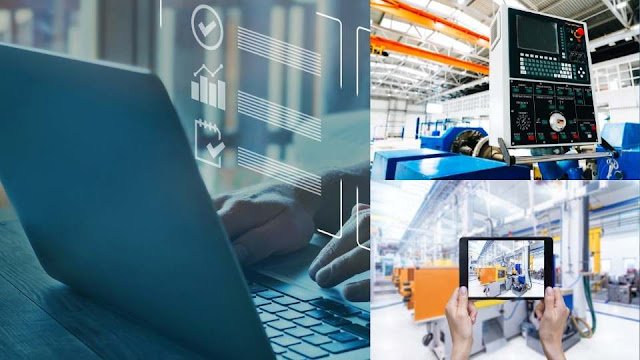Industrial Automation? : Industrial automation is the use of computerized
 |
Industrial Automation? : Industrial automation is the use of |
Industrial automation is the use of computerized, electromechanical, electro-pneumatic, and electrohydraulic systems for industrial purposes,
It is a broader engineering discipline than a control system, it encompasses industrial instruments :
Sensors: It is an object capable of regulating properties in the face of physical or chemical magnitudes, called instrumentation variables, and converting them with a transducer into electrical variables.
Field transmitters: They are controlled by microprocessors for the measurement and recording of variables, such as gauge pressure and differential pressure, and are used for the automation of operations in a plant.
Control systems: characterized by the presence of a series of elements that allow influencing the operation of the system.
Supervisory systems or SCADA systems (Supervisory Control And Data Acquisition): it is a concept used to make software for computers that allows remote control and supervision of industrial processes.
Transmission systems: it is a set of interconnected elements that is used to transmit a signal from one place to another and in different directions.
Data collection system: It is the activity of collecting data from a piece of information and processing it.
Software applications: It is software designed to perform a group of coordinated functions for the benefit of the user. In real-time to monitor and control the operations of factories or industrial processes.
WHAT ARE INDUSTRIAL AUTOMATION AND CONTROL FOR?
Every day it presents more demand in the industrial field since there is a rapid technological advance presented by the production processes that companies have.
The areas where automation and industrial control are developed include mining, cellulose, oil, petrochemical, electrical energy, metalworking, automotive, textile, food sectors, among others that require optimization in their production system.
AUTOMATION AND INDUSTRIAL ROBOTICS?
The various models of industrial automation that are used today are the human factor, providing less margin of error and the process is more precise.
Automation and industrial robotics are the pillars that made the consolidation of Industry 4.0 possible, and they bring with them many benefits for the productivity and efficiency of production resources, and at the same time, they free the human hand from repetitive or dangerous tasks.
A feature that industrial robotics has very good acceptance and applicability in the process industry is because they are machines that perform tasks repetitive and tedious so continuous and without reducing their effectiveness, so they are elementary for proper operation of a chain of frictionless mounting.
The automated system is capable of carrying out an activity without the need for human intervention and external supervision and guidance tasks.
This increases a world of possibilities for the applications of different types of industrial automation and the improvement of many processes.
Mentioning the word automation also implies talking about industrial robotics, about the use and design of robots to carry out automatic and controlled processes in the industrial field.
According to the demands and needs of the industry and production model, there are usually three automation models that can be applied:
Flexible automation: It is the type of industrial robotics articulated in a series of stations connected, but that work independently. This type of automation makes it possible for robots to work interconnected and for the exchange of information to coordinate their actions.
Fixed automation: This type of automated system may appear to be limited as it understands that the robot is programmed to perform a task consecutively. However, it is the type of industrial automation that is most beneficial and that achieves considerable efficiency improvements, thanks to the fact that a robot can perform repetitive tasks without losing precision.
Programmable automation: It is the type of automation in industrial robotics in which it is possible to reprogram the software that houses a robot. This reprogramming makes it possible for a robot to be reconfigured and perform various tasks, in which its automated action is very useful in productions where different variants or models have to be covered.
It can be confirmed that when the industry implements the automation of a process compared to manual work, it obtains benefits and economic, social, and technological advantages, and allows the company to develop in the market and has systems that make it more competitive.
Here you will find information about the types of machines, types of transistors, and what is CNC, PNP transistor, NPN transistor














it's an important post. so we are like it
ReplyDelete